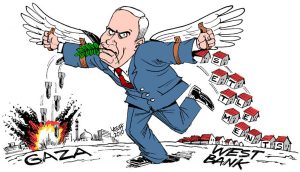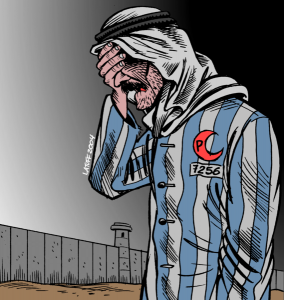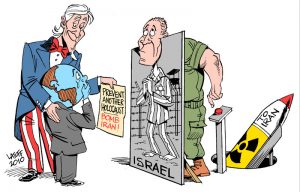A hero of freedom of speech, boycotted by the corporate mainstream media that are resistant to the astringent truth: this is the most precise introduction I can give about Carlos Latuff. Born in the suburbs of Rio de Janeiro, Brazil, he is an artist of conscience whose artistic commitment and morality prevented him from becoming the pawn of imperialism. Carlos Latuff is a world-renowned cartoonist who has long brought into existence artistic works and cartoons in which the footsteps of creativity, novelty, intelligence and decency can be noticeably traced. He has never been given the opportunity to showcase his matchless cartoons in the New York Times, Guardian, Washington Post, BBC or CNN. However, the narrow hallways of personal blogs and independent media outlets that allowed his cartoons to see the light of publicity, presented the world with a man of genuineness and reality, known by those who seek something beyond the outdated, obsolete propaganda of the West.
Carlos Latuff has drawn numerous cartoons that depict the pain of oppressed nations around the world; from the Palestinians being suffocated under the Israeli occupation to the Iranians being subjected to spates of psychological operations co-manufactured by the White House and Tel Aviv.
Following is the complete text of my interview with Carlos Latuff, conducted for Iran’s best-selling newspaper Jame-Jam, where we extensively discussed his intellectual mission and the prospects for his art.
Kourosh Ziabari: Dear Carlos; it seems that you’ve dedicated your entire mission to independent, freelance journalism, and one can clearly figure out that you are not usually paid for what you draw for the magazines, newspapers, and websites since a complete set of your cartoons and caricatures are available on your website for free. Would you accede to draw cartoons that are contrary to your ideological mindset should you be offered remarkable, irresistible payments?
Carlos Latuff: No way! I will only make artwork according my own leftist beliefs. I don’t trade ideology for money. I’ve worked for the leftist trade union press since 1990; that’s how I make a living. The mainstream media would never pay me for making anti-capitalist and anti-imperialist artworks. But I have what I call “artistic activism”, producing cartoons and making them available on the web for free of charge reproduction; cartoons with a different point of view from the Western mainstream media; cartoons exposing what Michael Moore would call “the awful truth”. I’ve already refused payments for my drawings about Palestine. Solidarity can’t be measured by dollars.
KZ: You’ve received serious death threats from Zionist circles and Israeli groups a number of times. Would you please explain for us a little about the details of these threats and the consequential events that followed them? Have you ever thought of putting aside your professional and artistic mission in order to preserve your safe, tranquil life?
CL: In 2006 a website associated to Likud published a long article about me, my art, and my support for Palestinians, and labeled me as an agent at the service of a supposed “Iranian propaganda machine”, comparing me with Nazi propagandists. The author of the article asked why Israel didn’t take care of me before and urged readers to take steps against me. Let me be straight, I really don’t care about threats. Along the Palestinian cause I also support human rights organizations against police brutality in Brazil. This kind of activism alone could put me in high risk of life. But, as I said, I don’t care; I will continue with my artistic support, ’cause if Zionists worldwide are pissed off about my cartoons, it’s because I’m doing something right. Death can stop me yes, but not my cartoons. That’s why I make them run free around the world through Internet.
KZ: You belong to a prosperous country that is the 8th largest economic power of the world and the 10th largest trade partner of the United States. Brazil also maintains normal ties with Israel, and this is something many anti-war and anti-imperialism activists dislike. Coming from such a country, you profoundly grasped the essence of oppressed nations’ suffering and sympathized with them wholeheartedly. How did you rise from Brazil and came to assist oppressed nations?
CL: I grew up in the suburbs of Rio and my parents worked hard to give me study and a humble but decent life. Being the 8th economic power makes no difference to the ordinary people in Brazil. We have poverty, corruption, criminal and police violence, influent and strong landowners in the countryside, people dying of dengue fever and malaria, and a mainstream media which is always trying to convince public opinion that everything is okay with capitalism. As someone living in a Third World country I can’t turn a blind eye to this situation here and in other parts of the world. Last year I was in Palestinian refugee camps in Jordan and Lebanon, places very similar to Brazilian slums (favelas). It wasn’t hard to realize that the language of poverty is universal, as the solidarity with people in need must be universal.
KZ: You’ve for years cooperated with a number of media outlets in Western countries and can precisely estimate the veracity of the slogan “freedom of expression” in the countries who introduce themselves as the harbingers of liberty and tolerance. I clearly remember the spates of verbal and political attacks on the artists who had participated in Iran’s International Holocaust Cartoon Competition. Even the then United Nations Secretary General Kofi Annan had condemned the contest and this could simply demonstrate the lopsidedness of “freedom” which they claim to be the pioneers of. What’s your idea about that? Are Western media outlets really free?
CL: Still today I’ve been accused of denying the Holocaust because of that artwork for which I won the second place in the Iranian cartoon contest. It’s funny since the cartoon shows a Palestinian elder wearing a concentration camp uniform, which not only affirms the existence of the Nazi Holocaust but also makes a comparison between it and the suffering of the Palestinians. I believe that this contest had exposed the Western’s double standard. When you ridicule and attack Prophet Muhammad (PBUH), Islam or Muslims, then this is called “satire”, “humor”, “freedom of speech”, whatever. Joking about Islam is pretty acceptable. Islamophobia is popular in the US and Europe, especially after September 11. However the same freedom you have for making cartoons about Islam and its Prophet you won’t have while dealing with Holocaust and Israel. If you dare draw Israeli soldiers killing Palestinians, you will be automatically labeled as anti-Semitic. While the Muhammad cartoons were wide spread in Europe, the Holocaust cartoons weren’t reproduced in any European newspaper [Editor’s note: the Danish newspaper Jyllands-posten published six of the least controversial cartoons].
KZ: Your stance towards Iran’s nuclear program (Iran intends to meet its energy, electricity needs through nuclear reactors) and Israel’s nuclear program (Israel possess up to 200 nuclear warheads, according to the Federation of American Scientists) is delicately accurate and specific, indicating your extensive acquaintance with the regional developments. Iran is being lethally pressured to halt its civilian nuclear program and Israel has been unconditionally safeguarded by Washington to keep up with its military atomic program. What’s your take on this?
CL: In fact all this turmoil about the Iranian nuclear program has more to do with the fear of the US, Europe, and Israel of having a country in the Middle East with a nuclear capability. It will change the geopolitics in the region, since no Arab country was ever allowed by the US to have anything nuclear. Only Israel can have not only nuclear plants but also nukes, immune to inspections and international law. Whether Iran will develop nuclear capabilities for civilian or military use, it doesn’t matter. The point is, if the US, Europe and Israel are so concerned about threats to peace, why don’t they start proposing sanctions against Pakistan and India, since both countries have had a nuclear arms race for a long time? Because both countries are allies of Washington? Why not a single word about the Israeli nuclear program? Why was Mordecai Vanunu prevented from speaking about it?










I can’t believe the U.S. dollar is still falling compared to the Euro. It’s been down since April and does not appear like it’s coming up anytime soon. Bad news for the USA economy.
The computer is the first metamedium, and as such it has degrees of freedom for illustration and expression never earlier than encountered and as but barely investigated. – Alan Kay
Do you individuals have a facebook fan web page? I appeared for one on twitter however couldn’t discover one, I would like to change into a fan! This one is an inspiration personally to uncover out way more related to this subject. I must confess your data extended my sentiments as well as I am going to proper now take your feed to stay updated on every coming weblog posts you would possibly possibly create. You might be worthy of thanks for a job completely performed!
[…]below you’ll find the link to some sites that we think you should visit[…]…
Wonderful items of your stuff, guy. I have comprehend your things previous to and you’re simply too superb. I like what you have obtained right here, definitely such as exactly what youíre stating and the way in which you say this. You make it enjoyable and you still take care of to maintain this wise. We canít wait to see a lot more from you. This is actually a terrific web site.I really desired to create a little remark in order to express gratitude to you for the fabulous info you are sharing only at that web site. My time intensive web research has at the end been compensated with wonderful understanding to create about along with my friends. I would mention that most of us visitors are unequivocally endowed to be in a really good place with lots of marvellous individuals with helpful techniques. Personally i think truly privileged to have come across your entire web page and look forward to truly more fun moments reading right here. Thanks once more for every thing.